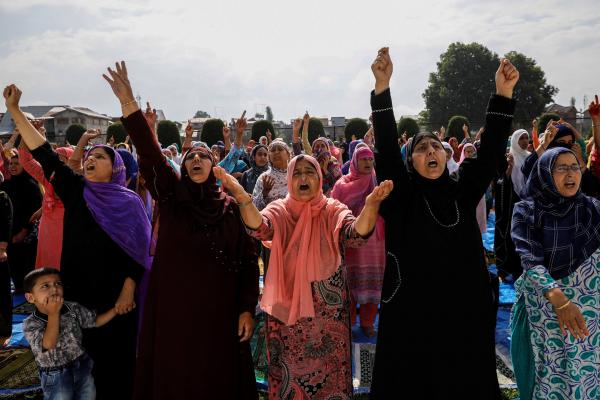In Narendra Modi’s India, an ominous new project is in progress. The recently instituted National Registry for Citizens (NRC) in Assam excludes almost 4 million from citizenship – effectively creating one of the largest groups of stateless people anywhere in the world. A majority of them are Muslims, and while those of other faiths can apply for reconsideration, Muslims cannot. Reports indicate plans to implement NRCs in other borderlands.
On August 5, Delhi annexed Kashmir, revoking its special status as a state that could, in theory, decide its policy regarding foreign affairs, defense, and communication. Historically restive, the disputed territory has been the subject of three Indo-Pakistani wars, and remains the most militarized region on Earth. In the days and hours leading up to the abrogation of Article 370, the Bharatiya Janata Party (BJP) deployed an additional 35,000 troops to the country’s only Muslim majority state and enforced a curfew. Political leaders were put under house arrest, the internet shut down, and all outgoing communication suspended. When the Article was struck down, Hindu-nationalists danced on the streets.
Far from being isolated instances of divisive policy, Assam and Kashmir are first indications of the BJP’s ultimate aim to create a nation exclusively for Hindus.
On the BJP's watch, hate crimes against Muslims have skyrocketed, Muslim political representation has plummeted, and Muslim economic inequality has widened. Data between 2009 and 2018 shows that 90 percent of religious hate crimes tracked were committed after Modi came to power in 2014. Muslims were victims in 62 percent of cases of religious violence; in cow-related attacks, that number jumped to 87 percent. As the body count of Muslims and non-Hindu minorities continues to climb, the country’s National Crime Records Bureau refuses to keep count.
While Modi’s response to hate has been tepid, Indian Home Minister Amit Shah has driven division from the highest echelons of power.
In March, while campaigning for re-election, Amit Shah vowed to “throw out all infiltrators and illegal immigrants” before confirming “that Hindu refugees would not be touched.” One month later, he called Indian Muslims termites before doubling down on the party’s Muslim deportation mandate: “A Bharatiya Janata Party (BJP) government will pick up infiltrators one by one and throw them into the Bay of Bengal.” Two months later, the newly reelected Narendra Modi assured the country that Indian Muslims were “living in a world of imaginary fear.”
Predictably, lower party leaders have followed suit. Pragya Thakur, who ran and won in Bhopal, is on record inciting a religious crusade. In July, BJP’s Sunita Gaud encouraged Hindu men to enter Muslim homes and rape Muslim women. Yogi Adiyanath, a Hindu-nationalist priest and Chief Minister of Uttar Pradesh, has long run a campaign against Muslim men marrying Hindu women. Those found “guilty” have been beaten, publicly shamed, and burned alive. Adiyanath loyalists have previously called for Muslim women to be dug up from their graves and raped. The list goes on.
Inciting sectarian violence for political gain has long been a hallmark of the BJP, but under Modi’s aegis, it has emboldened militant Hindu-nationalists to act with immunity.
In January 2018, an 8-year-old girl was gang raped in Kashmir in what emerged was a conspiracy to terrorize Muslims into fleeing the region. In the aftermath, BJP leaders publicly defended those accused. In March of the same year, a Hindu-nationalist was lauded as a hero after he hacked a Muslim man with a pickaxe, then burnt him alive. On June 22, 2018, another Muslim man was tied up and tortured by a mob chanting Jai Shri Ram (Hail Lord Rama); two days later, a Muslim teacher was thrown out of a train by a separate mob for refusing to repeat the mantra. In the aftermath, Modi took to the Parliament to express his shock and condemnation, then stood watch as members of his party heckled Muslim Parliamentary members with the same slogan as they took their oath of office.
Indian Muslims find themselves singled out today, but they have long been at the margins of politics and society. Never has a Muslim been elected Prime Minister, and Muslim participation in the government remains minimal. With Muslims comprising 14 percent of India's population, the number of Muslims in the Lok Sabha (Indian Parliament) should, in theory, be 76. The closest parliament has ever come to this figure was in 1980 when 49 Muslim MPs were elected. Since then, representation has steadily declined, and in 2014, the BJP became the first party with a simple majority to not have any elected Muslim MPs. In the last elections, the number of Muslim leaders who ran and won for the BJP stood at a grand total of one.
Banking on a clear religious and political majority, the BJP has pushed ahead with its plans to rewrite the history of India.
In 2018, the name of Allahabad was changed because the BJP took issue with the fact that the city's 435-year-old name was given by a Muslim ruler. In Yogi Adiyanath’s Uttar Pradesh, the Taj Mahal has been removed from travel brochures as Hindu-nationalists ponder its place in history. RSS, the unapologetic anti-Muslim Hindu-right group Modi has been a part of since his youth, has long argued that all Indians - including 172 million Muslims - were once Hindu. Recent reports suggest plans are underway to transfer the same “Hindu-first” ideology into school curriculums.
When considered together, Assam, Kashmir, and the state of Muslims across India provide clear proof of the BJP’s use of Islamophobia as statecraft. The message from the top is simple: India belongs to Hindus, and if Muslims want to stay, they must do so as second-class citizens. In Kashmir, they will see their lands settled; in Assam, they will live in constant fear of deportation. Under Modi, there will be oversight on how Muslims live, love, and die.
That should terrify us all.
Got something to say about what you're reading? We value your feedback!






